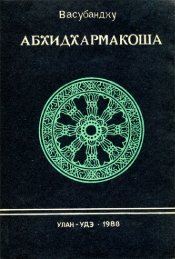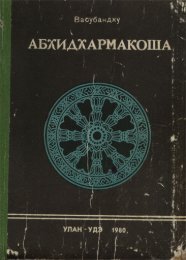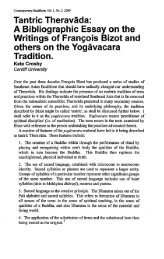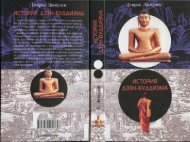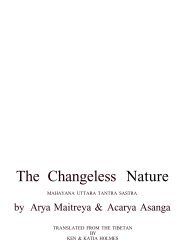- Page 2:
Fig. 1. White Tara. From a wood-blo
- Page 6:
First Indian Edition: Delhi, 1988 R
- Page 10:
vi FOREWORD Tibet has retained an a
- Page 14:
viii FOREWORD without further quali
- Page 18:
Preface THIS paper represents a fir
- Page 22:
PREFACE xiii The Indian anthologies
- Page 26:
PREFACE xv ch ts t P ch' j ts' dz t
- Page 30:
Contents ILLUSTRATIONS xix I WORSHI
- Page 36:
xx ILLUSTRATIONS 15 The outer offer
- Page 42:
I WORSHIP Offerings, Praises, and P
- Page 46:
i MAGIC AND RITUAL IN TIBET a poten
- Page 50:
6 MAGIC AND RITUAL IN TIBET constru
- Page 54:
10 MAGIC AND RITUAL IN TIBET icles,
- Page 58:
MAGIC AND RITUAL IN TIBET pattern o
- Page 62:
14 MAGIC AND RITUAL IN TIBET variou
- Page 66:
16 MAGIC AND RITUAL IN TIBET Fig. 4
- Page 70:
18 MAGIC AND RITUAL. IN TIBET eithe
- Page 74:
20 MAGIC AND RITUAL IN TIBET as of
- Page 78:
MAGIC AND RITUAL IN TIBET to serve
- Page 82:
MAGIC AND RITUAL IN TIBET and write
- Page 86:
26 MAGIC AND RITUAL. IN TIBET the m
- Page 90:
MAGIC AND RITUAL IN TIBET his maste
- Page 94:
30 MAGIC AND RITUAL. IN TIBET will
- Page 98:
32 MAGIC AND RITUAL IN TIBET Then h
- Page 102:
34 MAGIC AND RITUAL. IN TIBET essen
- Page 106:
MAGIC AND RITUAL IN TIBET events ar
- Page 110:
38 MAGIC AND RITUAL IN TIBET perfor
- Page 114:
40 MAGIC AND RITUAL IN TIBET . . .
- Page 118:
MAGIC AND RITUAL IN TIBET are depic
- Page 122:
44 MAGIC AND RITUAL IN TIBET Fig. 6
- Page 126:
46 MAGIC AND RITUAL IN TIBET Fig. 8
- Page 130:
MAGIC AND RITUAL IN TIBET deities t
- Page 134:
50 MA GIC A ND RITUA I IN TIBET Fig
- Page 138:
52 MAGIC AND RITUAL IN TIBET Fig. 1
- Page 142:
54 MAGIC AND RITUAL IN TIBET Sect H
- Page 146:
MAGIC AND RITUAL IN TIBET central T
- Page 150:
56 MAGIC AND RITUAL IN TIBET centra
- Page 154:
58 MAGIC AND RITUAL IN TIBET A drea
- Page 158:
MAGIC AND RITUAL IN TIBET Your blaz
- Page 162: 62 MAGIC AND RITUAL. IN TIBET Empow
- Page 166: THE PARADOX OF POWER MAGIC AND RITU
- Page 170: 66 MAGIC AND RITUAL IN TIBET power,
- Page 174: 68 MAGIC AND RITUAL IN TIBET only t
- Page 178: 70 MA GIC A ND RITUA I IN TIBET dei
- Page 182: 72 MAGIC AND RITUAL IN TIBET minute
- Page 186: 74 MA GIC A ND RITUA L. IN TIBET di
- Page 190: 76 THE CULT OF TARA say that it tak
- Page 194: 78 MAGIC AND RITUAL. IN TIBET In th
- Page 198: 80 MAGIC AND RITUAL IN TIBET Recoll
- Page 202: MAGIC AND RITUAL IN TIBET My Mother
- Page 206: 84 MAGIC AND RITUAL IN TIBET Piece
- Page 210: 86 MA GIC A ND RITUA L IN TIBET con
- Page 216: WORSHIP affections and the link of
- Page 220: WORSHIP one of his servants who is
- Page 224: WORSHIP 93 Hermes or the Egyptian T
- Page 228: WORSHIP Vasubandhu. Here, the proce
- Page 232: W0RSH1P awareness appears as- exter
- Page 236: WORSHIP 99 appearance of awareness.
- Page 240: WORSHIP public nonreality, and the
- Page 244: WORSHIP 103 public world awareness-
- Page 248: WORSHIP 105 Light radiates, serves
- Page 252: WORSHIP 107 In all the Tantras of y
- Page 256: WORSHIP 109 In the cycles of the Fa
- Page 260: WORSHIP 111 Perhaps the most import
- Page 264:
WORSHIP 113 The rituals of the high
- Page 268:
WORSHIP 115 the remaining acts of t
- Page 272:
WORSHIP 117 The four remaining limb
- Page 276:
WORSHIP 119 Except for these (rathe
- Page 280:
WORSHIP 121 Thus it is: the Bodhisa
- Page 284:
WORSHIP 121 Thus it is: the Bodhisa
- Page 288:
WORSHIP 123 Thus, too, the sixteen
- Page 292:
WORSHIP 125 Thus the gandharva may
- Page 296:
WORSHIP 127 of the bardo-being"]. H
- Page 300:
WORSHIP 129 cleansed by the Process
- Page 304:
WORSHIP 131 fish leaping from water
- Page 308:
WORSHIP 133 Whoever does not know E
- Page 312:
WORSHIP 135 insights, visions, supe
- Page 316:
WORSHIP 137 There are both ordering
- Page 320:
WORSHIP ate state and actual birth)
- Page 324:
WORSHIP 139 ate state and actual bi
- Page 328:
WORSHIP 141 Now at this point the b
- Page 332:
WORSHIP 143 But here again, this re
- Page 336:
WORSHIP 145 In general, the transla
- Page 342:
MAGIC AND RITUAL IN TIBET The outer
- Page 346:
150 MAGIC AND RITUAL IN TIBET Out o
- Page 352:
WORSHIP 153 1) We visualize all of
- Page 358:
156 MA GIC A ND RITUAL IN TIBET 3)
- Page 362:
158 MAGIC AND RITUAL IN TIBET 3) Th
- Page 366:
Fig. 19. The secret offerings, cont
- Page 370:
WORSHIP 163 5) . . . the laughing r
- Page 374:
WORSHIP 165 homage to the precious
- Page 378:
WORSHIP 167 this swirling nectar of
- Page 382:
WORSHIP ing one of the thirty-seven
- Page 386:
WORSHIP 171 the practitioner impose
- Page 390:
WORSHIP 173 "This is to say," he co
- Page 394:
WORSHIP and on the lowest row (near
- Page 398:
WORSHIP 3.111 To Tara 3.112 To the
- Page 402:
WORSHIP 179 Then, finally, putting
- Page 406:
WORSHIP ring their bells in the lon
- Page 410:
WORSHIP 183 Fig. 24. The bell and v
- Page 414:
WORSHIP 185 follow upon the heels o
- Page 418:
WORSHIP The lord possessed of great
- Page 422:
WORSHIP 189 whether with my body, m
- Page 426:
WORSHIP 191 I fill the many jeweled
- Page 430:
WORSHIP 193 VARANAM IDAM RATNA-MAND
- Page 434:
WORSHIP 195 You are our holy and gl
- Page 438:
WORSHIP I pray you: let the teachin
- Page 442:
WORSHIP I pray you that through his
- Page 446:
WORSHIP Jewels in general; and when
- Page 450:
WORSHIP 203 The verse is repeated s
- Page 454:
WORSHIP 205 whether actually set ou
- Page 458:
WORSHIP Then the flowers are thrown
- Page 462:
WORSHIP 209 DRAVAN "injuries," AKAL
- Page 466:
WORSHIP After the third mandala the
- Page 470:
Homage, Lady whose diadem is a cres
- Page 474:
WORSHIP And as before flowers are s
- Page 478:
WORSHIP 217 In this third ritual fo
- Page 482:
WORSHIP As the monks offer this tor
- Page 486:
WORSHIP NAMAH SARVA-TATHAGATA-AVALO
- Page 490:
WORSHIP 223 to practice enlightenme
- Page 494:
WORSHIP 225 may they long remain, r
- Page 498:
II APPLICATION Protection and Attac
- Page 502:
230 MAGIC AND RITUAL IN TIBET Enter
- Page 506:
232 MAGIC AND RITUAL IN TIBET histo
- Page 510:
234 MAGIC AND RITUAL IN TIBET Once
- Page 514:
236 MAGIC AND RITUAL IN TIBET engag
- Page 518:
238 MAGIC AND RITUAL. IN TIBET One
- Page 522:
240 MAGIC AND RITUAL IN TIBET After
- Page 526:
242 MAGIC AND RITUAL IN TIBET he he
- Page 530:
MAGIC AND RITUAL IN TIBET If one wi
- Page 534:
MAGIC AND RITUAL IN TIBET an abilit
- Page 538:
248 MAGIC AND RITUAL IN TIBET The p
- Page 542:
250 MAGIC AND RITUAL IN TIBET one m
- Page 546:
252 MAGIC AND RITUAL IN TIBET At la
- Page 550:
254 MAGIC AND RITUAL IN TIBET Initi
- Page 554:
256 MAGIC AND RITUAL IN TIBET A ful
- Page 558:
258 MAGIC AND RITUAL IN TIBET Thus
- Page 562:
260 MAGIC AND RITUAL IN TIBET mantr
- Page 578:
13. The portrait complete with hous
- Page 584:
262 MAGIC AND RITUAL, IN TIBET it.
- Page 588:
264 MAGIC AND RITUAL IN TIBET fierc
- Page 592:
MAGIC AND RITUAL IN TIBET or tinglo
- Page 596:
268 MAGIC AND RITUAL IN TIBET The a
- Page 600:
270 MAGIC AND RITUAL IN TIBET OM AG
- Page 604:
272 MAGIC AND RITUAL IN TIBET uncoo
- Page 608:
MAGIC AND RITUAL IN TIBET of nectar
- Page 612:
276 MAGIC AND RITUAL IN TIBET Varic
- Page 616:
278 MAGIC AND RITUAL IN TIBET visua
- Page 620:
280 MAGIC AND RITUAL IN TIBET if th
- Page 624:
282 MAGIC AND RITUAL IN TIBET These
- Page 628:
282 MAGIC AND RITUAL IN TIBET These
- Page 632:
284 MAGIC AND RITUAL IN TIBET recit
- Page 636:
286 MAGIC AND RITUAL IN TIBET occas
- Page 640:
MAGIC AND RITUAL IN TIBET too, had
- Page 644:
290 MAGIC AND RITUAL IN TIBET barle
- Page 648:
292 MAGIC AND RITUAL IN TIBET Tara'
- Page 652:
294 MAGIC AND RITUAL IN TIBET ritua
- Page 656:
296 MAGIC AND RITUAL IN TIBET Fig.
- Page 660:
298 MAGIC AND RITUAL IN TIBET Fig.
- Page 664:
300 MAGIC AND RITUAL IN TIBET "Our
- Page 668:
302 MAGIC AND RITUAL IN TIBET nant
- Page 672:
304 MAGIC AND RITUAL IN TIBET and e
- Page 676:
306 MAGIC AND RITUAL IN TIBET himse
- Page 680:
MAGIC AND RITUAL IN TIBET recites 1
- Page 684:
310 MAGIC AND RITUAL IN TIBET circl
- Page 688:
312 MAGIC AND RITUAL IN TIBET This
- Page 692:
the eight gifts and the five sense
- Page 696:
316 MAGIC AND RITUAL IN TIBET All w
- Page 700:
318 MAGIC AND RITUAL IN TIBET by th
- Page 704:
320 MAGIC AND RITUAL IN TIBET far a
- Page 708:
322 MAGIC AND RITUAL IN TIBET rinpo
- Page 712:
324 1 Preparations: offerings and s
- Page 716:
326 MAGIC AND RITUAL IN TIBET Fig.
- Page 720:
328 MAGIC AND RITUAL IN TIBET Fig.
- Page 724:
MAGIC AND RITUAL IN TIBET an effigy
- Page 728:
MAGIC AND RITUAL IN TIBET OM SVABHA
- Page 732:
MAGIC AND RITUAL IN TIBET The Tara
- Page 736:
336 MAGIC AND RITUAL IN TIBET sound
- Page 740:
338 MAGIC AND RITUAL IN TIBET assem
- Page 744:
340 MAGIC AND RITUAL IN TIBET outst
- Page 748:
342 MAGIC AND RITUAL IN TIBET seven
- Page 752:
34 MAGIC AND RITUAL IN TIBET may th
- Page 756:
2.24 Dispatching the substitutes 2.
- Page 762:
APPLICATION! The assembly binds the
- Page 766:
APPLICATION! Then they present this
- Page 770:
APPLICATION and avert, turn back th
- Page 774:
APPLICATION I pray you let us live
- Page 778:
APPLICATION As the music and the ma
- Page 782:
APPLICATION 359 "Let the invited kn
- Page 786:
THE POWER OF LIFE We have seen in c
- Page 790:
ACQUISITION The world of animate an
- Page 794:
ACQUISITION 367 THE SIGNS OF DEATH
- Page 798:
369 and defecates during sexual org
- Page 802:
ACQUISITION The text then explains
- Page 806:
ACQUISITION enjoyed by the lu serpe
- Page 810:
ACQUISITION a basically medical dia
- Page 814:
ACQUISITION bestowing initiations a
- Page 818:
ACQUISITION them with OM GURU-ARYA-
- Page 822:
ACQUISITION On the heart of myself
- Page 826:
ACQUISITION Here the text adds, beg
- Page 830:
ACQUISITION All these dissolve into
- Page 834:
ACQUISITION 387 But to do so, it is
- Page 838:
ACQUISITION jeweled ornaments and s
- Page 842:
ACQUISITION 391 exactly filling up
- Page 846:
ACQUISITION 393 the empowerment of
- Page 850:
396 MAGIC AND RITUAL IN TIBET withi
- Page 854:
398 MAGIC AND RIT Whatever has been
- Page 858:
400 MAGIC AND RITUAL IN TIBET read
- Page 862:
402 MAGIC AND RITUAL IN TIBET assem
- Page 866:
404 . MAGIC AND RITUAL IN TIBET sat
- Page 870:
406 MAGIC AND RITUAL IN TIBET The b
- Page 874:
408 MAGIC AND RITUAL IN TIBET words
- Page 878:
412 MAGIC AND RITUAL IN TIBET OM SA
- Page 882:
412 MAGIC AND RITUAL IN TIBET OM SA
- Page 886:
414 MAGIC AND RITUAL IN TIBET Again
- Page 890:
416 MAGIC AND RITUAL IN TIBET To wh
- Page 894:
418 MAGIC AND RITUAL IN TIBET Among
- Page 898:
420 MAGIC AND RITUAL IN TIBET diffe
- Page 902:
422 MAGIC AND RITUAL IN TIBET into
- Page 906:
424 MAGIC AND RITUAL IN TIBET Here
- Page 910:
426 MAGIC AND RITUAL IN TIBET May t
- Page 914:
428 MAGIC AND RITUAL IN TIBET Here
- Page 918:
430 MAGIC AND RITUAL IN TIBET the c
- Page 922:
432 MAGIC AND RITUAL IN TIBET THE R
- Page 926:
434 MAGIC AND RITUAL IN TIBET THE P
- Page 930:
436 MAGIC AND RITUAL IN TIBET place
- Page 934:
438 MAGIC AND RITUAL IN TIBET tain
- Page 938:
440 MAGIC AND RITUAL IN TIBET I pra
- Page 942:
442 MAGIC AND RITUAL IN TIBET he sh
- Page 946:
444 MAGIC AND RITUAL IN TIBET These
- Page 950:
446 MAGIC AND RITUAL IN TIBET 2.111
- Page 954:
448 MAGIC AND RITUAL. IN TIBET As a
- Page 958:
450 MAGIC ASD RITUAL IN TIBET unsta
- Page 962:
452 MAGIC AND RITUAL IN TIBET He vi
- Page 966:
454 MAGIC AND RITUAL IN TIBET upon
- Page 970:
456 MAGIC AND RITUAL IN TIBET Here
- Page 974:
158 MAGIC AND RITUAL IN TIBET ritua
- Page 978:
460 MAGIC AND RITUAL IN TIBET can w
- Page 982:
462 MAGIC AND RITUAL IN TIBET only
- Page 986:
MAGIC AND RITUAL IN TIBET tion and
- Page 990:
466 MAGIC AND RITUAL IN TIBET at be
- Page 994:
I PREFACE Notes 1 Ferdinand Diederi
- Page 998:
NOTES CHAPTER I: WORSHIP 1 Rgyal-po
- Page 1002:
NOTES 473 that "E. Schlagintweit tr
- Page 1006:
NOTES ti° nS ' 0f which we may men
- Page 1010:
NOTES pp. 54-57; there is an Englis
- Page 1014:
NOTES text; see, tor example, the "
- Page 1018:
NOTES 88 See Ferdinand Lessing, "'
- Page 1022:
NOTES las Andre" Breton, "II y aura
- Page 1026:
NOTES 169 Tsong-kha-pa, Sngags-rim
- Page 1030:
NOTES by another scholar; this part
- Page 1034:
NOTES und erlautert," Asiatica: Fes
- Page 1038:
495 46 Anonymous, Cora-bandha, P. 4
- Page 1042:
NOTES w 'Ja'-tshon snying-po, Zab-c
- Page 1046:
NOTES 499 'jigs-pa rang-grol zhes b
- Page 1050:
NOTES 29 Dkon-mchog yan-lag [Zhva-d
- Page 1054:
Non-Tibetan Sources Bibliography Ab
- Page 1058:
BIBLIOGRAPHY 505 David-Neel, Alexan
- Page 1062:
BIBLIOGRAPHY 507 Nebesky-Wojkowitz,
- Page 1066:
BIBLIOGRAPHY 509 Vidyabhusana, Sati
- Page 1070:
BIBLIOGRAPHY 511 Arya-srimati-kuruk
- Page 1074:
BIBLIOGRAPHY 513 Vaidyapada. Catura
- Page 1078:
BIBLIOGRAPHY 515 . Rje-btsun sgrol-
- Page 1082:
BIBLIOGRAPHY 517 Dpal gsang-ba 'dus
- Page 1086:
BIBLIOGRAPHY 519 Rin-chen rnam-rgya
- Page 1090:
522 INDEX Atisa, xiii, 3, 11, 12, 1
- Page 1094:
524 ma-yin-pa'i kun-tu rtog-pa], 91
- Page 1098:
526 AH HUM, 143, 380; the gift tor
- Page 1102:
528 INDEX Great Terrors ['jigs-pa c
- Page 1106:
530 INDEX K'ach'er [kha-khyer]. See
- Page 1110:
532 INDEX Lord of the Cemetery [dur
- Page 1114:
534 INDEX lama of the Lord [mgon-po
- Page 1118:
536 Pills, magic [ril-bu], 283, 284
- Page 1122:
538 INDEX Rigdzin zhigpo lingpa [ri
- Page 1126:
540 INDEX bskyed], 177, 178, 189, 2
- Page 1130:
542 INDEX — four [rnal-'byor bzhi




